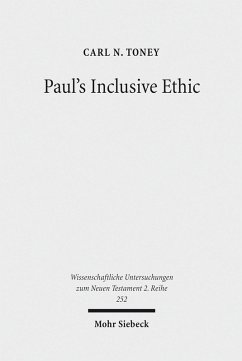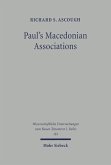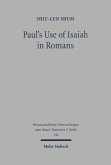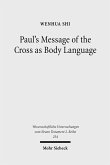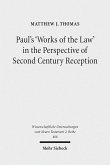In Rom 14-15 Paul promotes an inclusive ethic by advising the strong (mainly Gentile Christians) to allow for certain Jewish practices performed by the weak (mainly Jewish Christians) in order to unify the Roman Christian community through an environment that is not socially divisive so as to advance his broader vision of unifying Jewish and Gentile Christians and to encourage an outward mission to non-Christians in Rome. In the first half of the study, Carl N. Toney focuses upon Rom 14-15. He begins with a social reconstruction of the Roman Christian community by exploring the problem of the divisions created when both Jewish and Gentile believers blur their Christian identity with culturally divisive practices related to the adherence or rejection of Jewish diet and days and the negative social impact of those choices. Next, in an exegetical study he considers how in Rom 14:1-15:6 Paul presents his inclusive ethic, which offers a solution to these divisions, and the expansion of this ethic in Rom 15:7-13, which promotes an outward mission to non-Christians. The second half of the study interprets Rom 14-15 in light of insights gained from Rom 11 and 1 Cor 8-10. Thus, both the inclusive ethic and concern for mission, as presented in Rom 14-15, are rooted in the letter's prior argument in Rom 11 that Gentile Christians have an obligation to Christian and non-Christian Jews. Also, Paul adapts his previous arguments from 1 Cor 8-10 of 'becoming all things to all people' so as to promote in Rom 14-15 an accommodation to others both inside and outside the Roman community. Born 1975; 1998 BA; 1998 Adjunct Professor of Biblical Studies, Swaziland Evangelical Bible Institute; 2002 MDiv; 2005-2006 Adjunct Professor of New Testament, Azusa Pacific University; 2007 PhD; 2007-2008 Assistant Professor of New Testament and Literature, Biola University, USA; 2008-2009 Adjunct Professor, Fuller Theological Seminary.
Dieser Download kann aus rechtlichen Gründen nur mit Rechnungsadresse in A, B, BG, CY, CZ, D, DK, EW, E, FIN, F, GR, HR, H, IRL, I, LT, L, LR, M, NL, PL, P, R, S, SLO, SK ausgeliefert werden.

